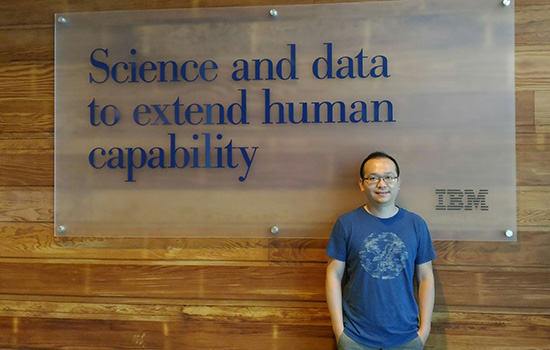Ph.D. in computing and information sciences—Ken Wong
Ken Wong ’10, IBM
Ken Wong ’10 (computing and information sciences) is working with IBM Watson Health to help save lives.
As a research staff member at IBM Research since earlier this year, Wong is teaching the artificially intelligent computer system Watson—made famous by its winning run on the quiz show Jeopardy!—how to identify specific features in X-rays, MRI scans and other medical images.
Using Wong’s work and the cognitive computing power of Watson, doctors will be able to diagnose diseases faster and more accurately.
“Medical images are essential for finding problems, such as tumors, but it can be very time consuming and easy for humans to miss things,” said Wong. “With the help of a trained eye like Watson, physicians will know what areas they should concentrate on for each individual patient.”
Wong began his work with computational physiology and medical image analysis as a student at Hong Kong University of Science and Technology. In 2007, he made his way to RIT on the tails of his Ph.D. adviser, Pengcheng Shi.
Shi had been hired to lead the new Ph.D. program in RIT’s B. Thomas Golisano College of Computing and Information Sciences. The interdisciplinary degree would allow Ph.D. students to conduct both hard-core computing research and work in other fields—including medicine, art and engineering—that can be assisted, enabled and inspired by research in computing.
“I invited Ken and several other students to come with me and finish their degrees,” said Shi, director of the Ph.D. program and associate dean for Research and Scholarship. “Ken sets high expectations for himself and has a true passion for his work.”
As a student, Wong’s research challenged him to use imaging data to understand the mechanics of the human heart. Collaborating with Linwei Wang, fellow Ph.D. student and current associate professor in the Ph.D. program at RIT, the team created a computer simulation of the complete electro-mechanical physiology of the heart.
After graduating, Wong continued this work and moved to France to become co-leader for the $25 million euHeart Project with the French Institute for Research in Computer Science and Automation. The group developed individualized, computer-based, human heart models that could provide insight into the origin and progression of specific disease patterns, including those associated with heart rhythm disorders and coronary artery disease.
“Usually, the computer-generated models are not patient specific,” said Wong. “But with individualized models, a surgeon can run countless simulations before actually operating on a patient.”
Wong has tested the waters in academia—teaching several Ph.D. courses at RIT as a visiting assistant professor. He also spent time at the National Institutes of Health creating personalized models for predicting tumor growth.
“I have discovered that if I work for a private company like IBM, my research will make its way to products faster,” Wong said. “This gives me a higher chance to really contribute to patients and society as a whole.”
Alumni today
Graduates take on roles in computer theory, networking, software engineering, finance, big data, animation, cybersecurity and academia. They work at Intel, Qatar Computing Research Institute, Google, Microsoft, Uber, RIT and Stevens Institute of Technology.











